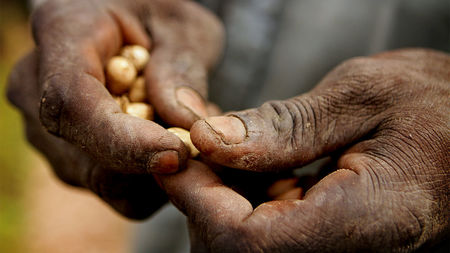FAIRTRADE - why it's time we all make the change

FAIRTRADE - why it's time we all make the change.
Another day, another raft of articles and blogs publishing accounts of devastating effects from the sustained low trading index of raw coffee beans.
We drafted this blog in late March 2019 for our April Newsletter that ended up not being published.
In finally getting around to post the blog on our site, we were somewhat gazumped by Fairfax Media with an article published in their Age and Sydney Morning Herald newspapers on the 1st June, hence we had to make some changes to our blog for fear of being labelled lazy or copycats.
Most stories about the plight of coffee farmers quote prices at the extreme end of the index (which has only some loose relativity). It's often presented or packaged with this worst-case end of the spectrum intended to generate maximum impact or outrage, depending upon your beliefs.
It's emotional whenever something exposes a quantum, perverse gap between prices paid to farmers and what the finished product sells for in a retail environment - just look at what happens to the dairy, fruit and vegie farmers in Australia - paid a fraction of the selling price.
However, the reality and context of this disparity can indeed be quite different and the point of this article is not to defend other entities in the coffee supply chain, but to bring some balance and context to the situation without hysteria.
Raw coffee's trading index (known globally as the "C") has always tracked with broad volatility not unlike oil in it's ability to spike from lows to highs in short timeframes - influenced by speculation and futures around the tensions between a delicate balance of supply versus demand. Sometimes, this tension is artificially stimulated or manipulated by "fears of deficit".
Current weather, long-range forecasts and estimates of crop yields, currency strength, expected qualities, etc. all factor into the "positions and outlook" but mostly it's a case of prevailing "perceptions" set by commodity traders in New York, those keyboard warriors far removed and insulated from the harsh conditions and brutal labour performed in fields of coffee plantations.
It's the traders that set the price (or index) and often the price bears little relationship to the quality, particularly in some segments where it's more commodity based.
Contrary to the barrage of stories about low coffee prices and missing from this constant narrative of lowest prices are the real situations that some origins, albeit the smaller minority, have been and are currently quite expensive.
So how can this happen...........coffee supplied from some countries at all-time lows and yet other countries at all time highs ?
To give you some insight, we have been paying 500% - 1200% higher than the base "C" for Kenyans, Sumatran and Costa Ricans. Yes, that's right, we pay more today for those origins than we ever have in the last 12 years and certainly a lot more than when the C-Index was almost 3 times higher in 2011 compared to what it is today.
In fact, the value of the C-index for those origins in high demand/short supply has literally zero effect upon their trading prices - so that means those origin's set their own prices and the market pays if they want to buy it, which invariably they do (and subsequently we do because our customers want it).
So when you see that some coffee roasting companies are "angling" for exposure by proclaiming they are paying "X" over the C-index, it's really just smoke and mirrors because they have to pay those prices because the "other" costs associated with warehousing, transport and holding costs are high.
It's no contest - coffee farming is mired in poverty and modern slavery.
That's not to say we should dismiss the plight of coffee farmers - they work hard and get paid small sums relative to the efforts and risks involved.
Coffee at the farming level has been in deep crisis for what seems like forever. I've been around coffee since 1984 when my mother opened her cafes and rarely have there been "golden eras" where farmers enjoyed higher levels of profits than those taken in other parts of the supply chain.
There's no denying that the situation today is dire and it's not just the current sustained bottom pricing cycle but a long history of declining prices relative to rising costs (or what should be called deflation) afflicting many 3rd world export commodity markets.
The longer-term consequences with farmers receiving poor returns from low prices are situations that are not going to be immediately obvious to most, particularly coffee roasting companies.
Farmers, like any other type of business will respond in the only way they can by reducing the levels of care and management of their holdings - no longer able to afford the standard necessities such as fertilizers, pesticides and more importantly the labour that tends to tree health (pruning, weeding, irrigation, etc) won't be completed, leading to declining stocks.
Today, we are seeing typical coffee plantations whereby the normal staff levels of 20+ have been slashed to just 3 or 4 in a grim battle for survival.
Coffee trees are delicate plants - they only prosper in certain conditions where the temperature, altitude, soil, climate and weather patterns promote the critical flowering and cherry processing. Frosts, droughts or rain at the wrong times in the season can drop the developing flowers and cherries before maturing.
There is also the impact and effects of global warming - higher humidity levels from changing weather conditions contributing to difficulties for farmers to combat the ever present risks of leaf rust and coffee borer. In some origins, up to a quarter (or more) of the entire harvest can be lost to leaf rust or borer, further eroding farm returns.
Without the essential funds to care and manage their trees, the farms come under attack from pests, the crop quality degrades, yields are reduced and the returns from harvest spiral further downwards.
Worse still, the communities around coffee farming decline into poverty, farmers can't afford to keep workers on their payroll, so they move away to seek other employment opportunities and towns lose their economic sustainability.
A direct impact of less care is the drop in quality of the coffee. The trees suffer and the fruit (cherry) is lower in quality - the cycle can take many years (seasons) to rebuild.
Origins like Costa Rica, Panama, etc. see better prospects in converting their lands used for coffee plantations into commercial and residential real estate, reducing the available land for coffee farming, lowering the harvest volumes and further driving up the price differentials.
So what's the solution ?
Current indications are that there is no visible sign the C-Index will rise in the short term, although I don't agree with that sentiment. I think we may see a promising uptick in the index sooner rather than later because there has been too much pain for too long a period.
Powerhouse origins like Brazil, Honduras and Colombia are forecasting good crop volumes which is helping match demand. Globally, coffee consumption increases by a relatively low rate of 2 - 3 % but when harvests yields are sitting in double digit growth zones it keeps a lid on price negotiations. It's only when adverse weather or coffee leaf outbreaks cause crop volumes to fall and demand to outstrip supply.
Over the last 12 months, there has been a groundswell of anger building at the farming level and many are predicting some estates will make decisions to "skip" a harvest to avoid running at a loss, waiting on the sidelines for a rebound in prices. Some are even abandoning their farms.
It's not a new strategy and sellers have often played this game to "control" supply, but the greater concerns are when farms skips a harvest, there's a valid danger zone that emerges where coffee trees are not managed and the resulting cup qualities are at real risk of decline.
When the coffee drinking public demands better tasting coffee and the farmers are not tending to their trees, you can see a widening gap emerge.
A Fairer system
FAIRTRADE is a global organisation committed to improving the lives of producer communities by regulating and ensuring a fair, minimum price is paid to farmers for their hard-earned crops. It's not confined to just coffee, but extends into other commodities like cocoa, sugar, etc.
We originally completed our certification for FAIRTRADE in 2009 as part of a supply contract with Monash University in Melbourne. In the period since we have continued to participate in the FAIRTRADE program as part of our broader coffee portfolio offering to the Australian market.
Disappointingly, many Australian coffee roasters still turn their backs on the FAIRTRADE system, mostly because they don't like being audited or they don't like sourcing raw coffee from a small, limited list or range, so the adoption rate in FAIRTRADE remains low relative to the 2000+ brands being sold in Australia.
I'll be the first to admit that......... in hindsight we probably have not done enough at our end in the past to actively promote or educate customers on the benefits of purchasing FAIRTRADE products.
Yes, there are plenty of excuses like being too busy, etc. but the reality is that we have treated our FAIRTRADE segment with a casual and falling into the trap of over-reliance upon the FAIRTRADE organisation (FLANZ) to build the broader consumer awareness via their ongoing market campaigns.
I've also been somewhat critical of the levies imposed upon coffee roasters for participation in the supply chain, but my thoughts around the levies have changed - it's now time to take a stand so we can help secure the future of coffee farming communities around the world.
Leading with FAIRTRADE.
In the last 12 months I've sat with many coffee farmers and heard their stories of struggle to survive in a modern age where the economic odds are stacked against them. It's more than heart-breaking.
Respecting the plight of coffee farmers during this difficult period has energized our focus on what's really important. It questions what can we do as a company across the social, moral and ethical boundaries to increase support levels for this critical area of the coffee supply chain.
Without coffee farmers we have no business and no way to pursue our passion for enjoying everything we love about the coffee experience.
Last month we ran a certified FAIRTRADE Organic coffee as our Secret Label. We did not charge a higher premium on the selling price for this product, but we did pay the "full FAIRTRADE price and levies" in sourcing the raw coffee so that the farmer received all the FAIRTRADE premiums for his crop.
We did this for two important reasons - firstly to demonstrate that FAIRTRADE coffees are in fact good tasting and eliminate any bias or perception for our customers to consider future purchases of FAIRTRADE coffees.
Secondly, it's a key signal from us that we are building a stronger focus and strategy behind the marketing of certified, socially responsible products as we plan greater emphasis on the FAIRTRADE segment.
Rebooting the mindset
In the last few months, Australian coffee forums have been alight with debates about the perceived savings from "cheap" supermarket coffees. Whilst forums are not to be considered a bell-weather of our society, it's important to recognize the trends.
As things often do in forums or platforms where anonymous commentary reigns, debates morph into tribal contests and in this case it became a war between the "economizers" were pitched against the purveyors of higher quality coffees.
Observing the arguments has been a remarkable, but not surprising, source of entertainment - it took some resolve to "hold fire" from commenting or correcting often misleading or incorrectly positioned rhetoric.
On one side you have the bargain hunter fanatics proudly trumpeting how much they save buying the "cheap" coffee in the supermarket, particularly when it's on special. Unfortunately, they also tend to enjoy taking pot shots at the rest of the coffee supply community with ill-informed comments claiming every other supplier is ripping off customers - all without basis or substance to backup the loose, ambit claims.
The sole purpose of the economizer shopper is to save as much as they can and often there are accompanying delusional comments that the cheaper product is equivalent to everything else, implying there's no discernable difference for the extra $$.
OK, we get it, some people must live or survive on a tight budget, but throwing around nonsense judgements to justify actions are not always appropriate or valid.
On the other side are the enthusiasts who seek holy grail-type coffee experiences and think nothing of paying for that privilege - their argument is they work hard and wish to enjoy it. The enthusiasts speculate or question the authenticity of the economizer's comments as it's often these days that large armies of secretly paid "nano-blogger" are recruited to make a few desperate bucks for getting supermarket brands promoted in the broader tentacles outside of the traditional Insta/FB/Twit social media platforms.
In other words, consumer beware - you can never trust what you read on the internet as there may always be a hidden agenda - carefully co-ordinated via 3rd party marketing agencies to keep the "brand" clean of being caught with dirty hands.
Regrettably, it's only a few instances during these fiery debates where the focus has highlighted on the consequences of "buying dirt cheap coffees". We wrote our article here a few months ago about the hollow certification programs used by large commodity brands to bring a false sense of ethical sincerity to their products by association. Programs like the toothless tiger Rainforest Alliance/UTZ are just logos without substance or action.
It comes as no surprise to intelligent consumers that most of the coffee offered for sale in supermarkets is sourced at the "grubby" end of the market. This is where the main game is argy-bargy for the lowest possible price and grades - a brutal war of dirty deeds, done dirty cheap.
When you buy coffee products that are sourced from the lowest pricing, it's important to know you are directly supporting a poverty trap for coffee farmers.
In that segment, farmers are always screwed down on price in a cycle they can't escape, with no financial resources available to help improve their crops and lift themselves out of the commodity spiral into the higher qualities and prices paid by specialty grade sourcing.
Buying coffee with a conscience
When you support FAIRTRADE, the difference per cup of brewed coffee worked out on a daily basis is small and insignificant, literally just a couple of cents, yet the impact of the higher prices paid at the farm gate is far greater. It also support other programs such as extra education and welfare initiatives run by the FAIRTRADE organisations travelling and spending time in the coffee farming communities.
As a company, we sell our certified FAIRTRADE coffees well underneath our main competitor's pricing - in some instances we are literally half the price and quite frankly a lot fresher.
Sure, we could have made some extra $$ per kilo along the way over the last decade if we played to the market and added the "taxes and exclusivity", but we didn't.
Instead we decided upon a set of ethical principles right from the beginning of our FAIRTRADE journey to sacrifice the "opportunity to charge more because it's special and not everyone is certified" as we truly believed in the social rewards delivered to farmers.
For FAIRTRADE to be successful, it needs to have any barriers for purchase removed.
For us, that meant it was important we encourage higher uptake amongst our customers by eliminating one of the most obvious barriers to purchase..... higher pricing.
Yes, certified coffees are more expensive for us to source and we also pay levies on the sale of any product, they are sold at a moderate premium but we know these premiums are being used to improve the livelihood of coffee farmers around the world.
Next time you purchase coffee, please consider supporting FAIRTRADE.



